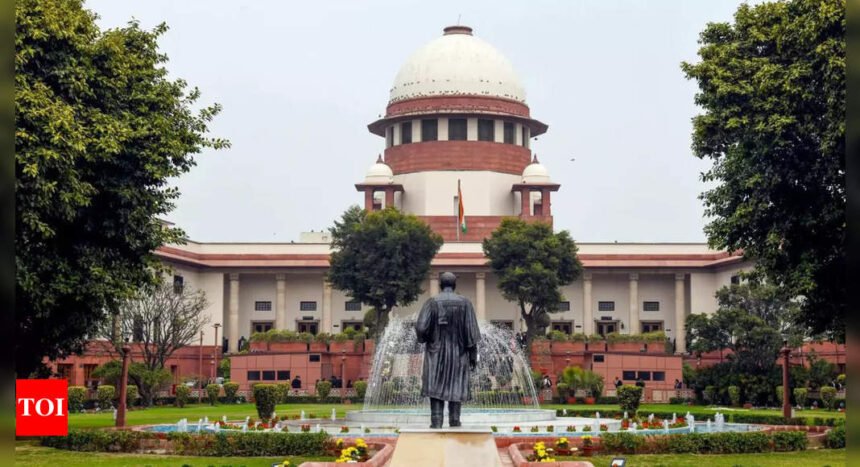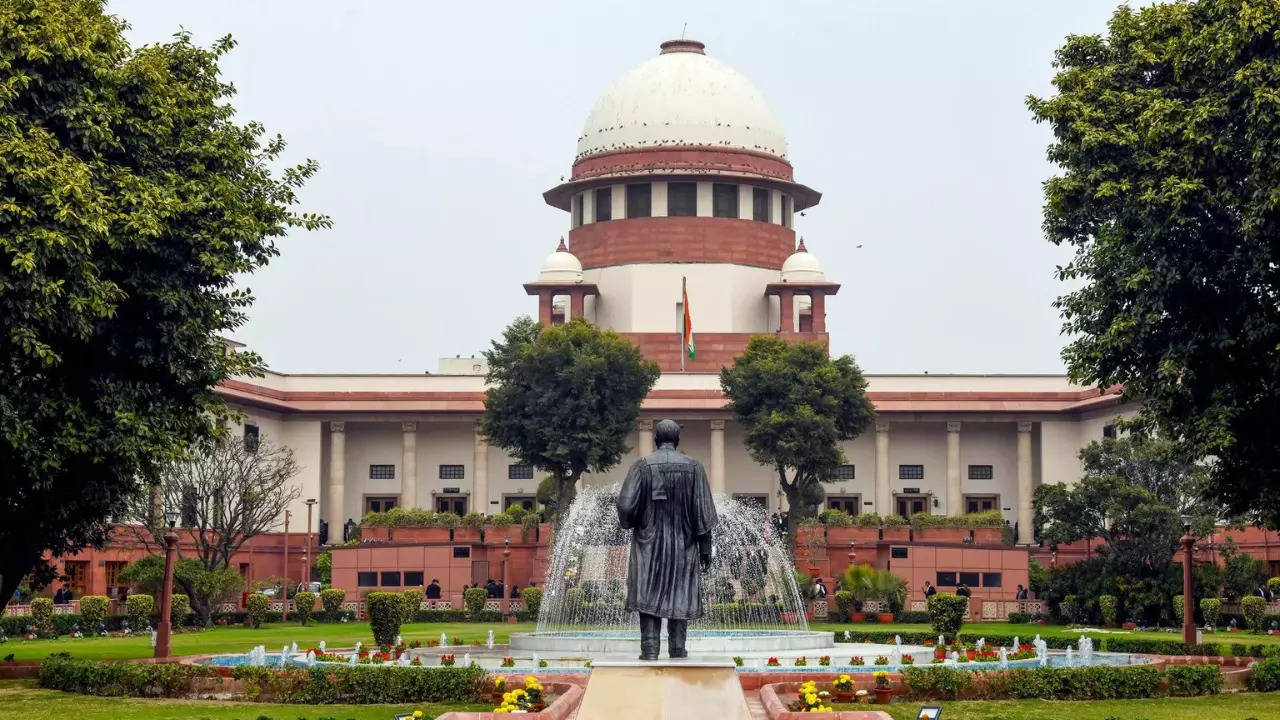[ad_1]
NEW DELHI: The Supreme Court on Monday issued notice while hearing a writ petition seeking a declaration that a person who was born a Muslim, but ceased to be a believer, would not be governed by the Shariat law. After thorough discussions, the bench, led by Chief Justice of India DY Chandrachud along with Justices JB Pardiwala and Manoj Misra, issued notices on the petition, considering it an “important issue.”
The bench highlighted that the Indian Succession Act prohibits individuals born into the Muslim faith from availing themselves of secular law, even if they formally declare under Section 3 of the Shariat Law that they no longer wish to follow Islamic law.Moreover, the bench asked the Attorney General for India to appoint a law officer who can provide assistance to the Court on this matter. The next hearing for this case is scheduled for the second week of July 2024.
The writ petition has been lodged by Safiya PM, a woman from Kerala who serves as the general secretary of an association representing ex-Muslims in the region. In her plea, Safiya advocates for a declaration asserting that individuals who choose not to be bound by Muslim Personal Law should have the option to be governed by the secular laws of the nation, specifically the Indian Succession Act of 1925, in matters of both intestate and testamentary succession.
You don’t necessarily need to seek that declaration. Because Section 3 of the Shariat Act says that unless you make a declaration, you will not be governed by the provisions of the personal law in the matter of wills, adoptions, and legacies. So if you don’t make a declaration, your father doesn’t make a declaration, they are not governed by the personal law,” the CJI said.
However, later on, the bench, including Justices J B Pardiwala and Manoj Misra, concurred with Safiya’s counsel, Advocate Prashant Padmanabhan. “There seems to be an issue here. Without a declaration, there remains a gap as the secular law does not automatically apply. Initially, we were unsure about the nature of this petition. However, now that we’ve delved into it, it appears to raise a significant point. We will proceed by issuing a notice,” remarked CJI Chandrachud.
The plea cited the Supreme Court’s Sabarimala judgment, asserting that the fundamental Right to Religion under Article 25 of the Constitution of India must include the freedom to believe or not to believe. It argued, “For this Right to have significance, individuals who choose to leave their faith should not face any disability or disqualification in matters of inheritance or other significant civil rights.”
The plea highlighted that the petitioner, “a woman born into a Muslim family with a non-practicing Muslim father who has not formally renounced the religion, is encountering a unique challenge in safeguarding her fundamental civil rights.” It further stated that Safiya “desires a declaration that she shall not be subject to Muslim Personal Law for any matters outlined in section 2 or 3 of the Muslim Personal Law (Shariat) Application Act, 1937. However, there is no provision either in the Act or its accompanying rules through which she can obtain such a certificate.” The plea argued that this represents a clear gap in the statute which could be addressed through judicial interpretation.
“At present, even if the petitioner were to officially acquire a no-religion, no-caste certificate from any authority, she would still not be governed by the secular laws of the country, specifically the Indian Succession Act, 1925. Thus, the petitioner’s fundamental rights under Article 25 are rendered futile due to the lack of such protection from the State,” it added.
(With inputs from agencies)
The bench highlighted that the Indian Succession Act prohibits individuals born into the Muslim faith from availing themselves of secular law, even if they formally declare under Section 3 of the Shariat Law that they no longer wish to follow Islamic law.Moreover, the bench asked the Attorney General for India to appoint a law officer who can provide assistance to the Court on this matter. The next hearing for this case is scheduled for the second week of July 2024.
The writ petition has been lodged by Safiya PM, a woman from Kerala who serves as the general secretary of an association representing ex-Muslims in the region. In her plea, Safiya advocates for a declaration asserting that individuals who choose not to be bound by Muslim Personal Law should have the option to be governed by the secular laws of the nation, specifically the Indian Succession Act of 1925, in matters of both intestate and testamentary succession.
You don’t necessarily need to seek that declaration. Because Section 3 of the Shariat Act says that unless you make a declaration, you will not be governed by the provisions of the personal law in the matter of wills, adoptions, and legacies. So if you don’t make a declaration, your father doesn’t make a declaration, they are not governed by the personal law,” the CJI said.
However, later on, the bench, including Justices J B Pardiwala and Manoj Misra, concurred with Safiya’s counsel, Advocate Prashant Padmanabhan. “There seems to be an issue here. Without a declaration, there remains a gap as the secular law does not automatically apply. Initially, we were unsure about the nature of this petition. However, now that we’ve delved into it, it appears to raise a significant point. We will proceed by issuing a notice,” remarked CJI Chandrachud.
The plea cited the Supreme Court’s Sabarimala judgment, asserting that the fundamental Right to Religion under Article 25 of the Constitution of India must include the freedom to believe or not to believe. It argued, “For this Right to have significance, individuals who choose to leave their faith should not face any disability or disqualification in matters of inheritance or other significant civil rights.”
The plea highlighted that the petitioner, “a woman born into a Muslim family with a non-practicing Muslim father who has not formally renounced the religion, is encountering a unique challenge in safeguarding her fundamental civil rights.” It further stated that Safiya “desires a declaration that she shall not be subject to Muslim Personal Law for any matters outlined in section 2 or 3 of the Muslim Personal Law (Shariat) Application Act, 1937. However, there is no provision either in the Act or its accompanying rules through which she can obtain such a certificate.” The plea argued that this represents a clear gap in the statute which could be addressed through judicial interpretation.
“At present, even if the petitioner were to officially acquire a no-religion, no-caste certificate from any authority, she would still not be governed by the secular laws of the country, specifically the Indian Succession Act, 1925. Thus, the petitioner’s fundamental rights under Article 25 are rendered futile due to the lack of such protection from the State,” it added.
(With inputs from agencies)
[ad_2]
Source link





